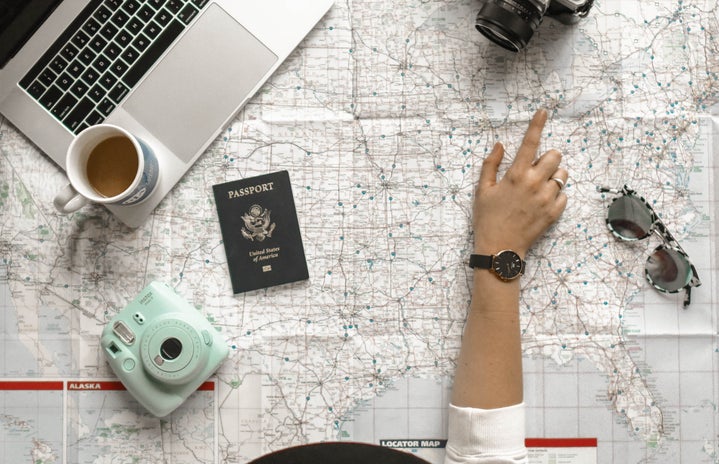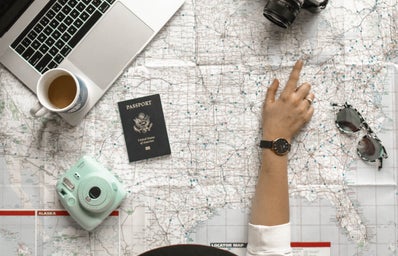As pre-collegiettes become collegiettes, many new opportunities present themselves. With a new sense of freedom, many of us embark on trips abroad. Some choose to hit the road by going backpacking over the summer, while others embrace the study abroad experience. Either way, collegiettes are exposed to amazing experiences, life lessons, lasting friendships, and moments they will never forget. However, going abroad can be dangerous if not handled correctly, especially if a collegiette is traveling alone.
No matter how you choose to travel abroad, here are some safety tips to keep you out of danger’s way while you are exploring different countries!
1. Always be aware and cautious
This might seem like common sense, but it is important to be a hundred times more aware and cautious when you are traveling alone in a foreign country. You don’t need to become a Nervous Nelly who is constantly suspicious of everything and everyone, but you do need to be more attuned to your surroundings. “Part of the fun of traveling is taking chances by moving outside of your comfort zone. However, you should continually monitor your surroundings,” says Nick Gozik, director of the Office of International Programs at Boston College.
While it is never fun to assume the worst of people, sometimes it is better to be overly cautious. The wise words, “better safe than sorry,” are extremely cliche but important when it comes to traveling overseas alone.
2. Plan well and let friends and family know of your plans
Moms and Dads are definitely huge proponents of this tip, but keeping your other family and friends up to date on your whereabouts will only help you out in the long run. Gozik, suggests leaving a copy of your itinerary with your family and checking in with them often. “Your friends and family will be reassured to know that you are safe, and they will likely enjoy experiencing the trip vicariously through you,” he says.
Put a plan in place with your parents in terms of how often they should expect to hear from you.
Darci Miller, a senior at the University of Miami, made sure to keep all her loved ones in the loop while abroad in London. “It definitely was tricky because of international calling plans and fees, but whenever there was wi-fi I would send my mom a Facebook message letting her know that I was still alive and well,” she says.
3. Choose your purse (and other baggage) wisely
Collegiettes love their accessories, so before you head abroad, make sure to purchase sensible purses, bags and suitcases. The right purse might be what saves you from becoming a victim of a local pickpocketer. Gozik recommends bringing a bag or purse that can be zipped, especially if you’re going to a big city. “Purses that are open at the top can make it easy for pickpockets to pull out wallets, passports, and other valuables,” he says. “A purse that has an inside pocket, which can be zipped, is especially valuable.”
Jenna Fanduzzi, a student at Marquette University, went to Barcelona one summer and says there were pickpockets everywhere. “I brought a small shoulder bag and was pretty good about keeping it with me at all times,” she says. “However, one of the girls on my trip put down her purse for a brief moment and the purse was instantly snatched. Luckily, she only had a phone and a driver’s license in the bag, so it’s also a great idea to not carry your entire wallet at all times—only bring what you absolutely need.”
4. Read up on each of your destinations
More information will only help you. Gozik encourages students to read up about the customs and norms of the cultures of the places you are traveling to before you go, and bring information along with you as you travel. “It is easy to learn the basics by consulting websites and guidebooks,” he says. “If you have more time, read longer books, watch films, and talk with people from the host culture. The more you know, the easier job you will have of blending into local culture, and in turn be less of a target for crime and harassment.”
Anna Teale, a student at Nottingham University, swears by Lonely Planet travel guides. “I traveled around Vietnam and Thailand this summer and could not have done it without buying the Lonely Planet guide for each country,” she says. “The guide goes into the finest details and lists all the hotels and restaurants of each area, as well as things to do and the nearest pharmacies, hospitals, etc.”
There are great foreign travel opportunities through companies like Contiki, where you can safely explore the continent alone, but still, have the safety and security of a group. Another benefit of Contiki trips is that their Tour Managers are like human guidebooks—they can give you all sorts of information, from where to eat to how to interact with locals to how to beat lines of tourists.
5. Look at a map before you head out
One of the worst things you can do while traveling alone is to be that person who is clearly a tourist and unfamiliar with the area. Unfolding a giant map while walking through a city is a surefire way to become that person. The best way to appear less touristy? Look at your map before you hit the town. “If you absolutely need to look at a map while you are out touring, try folding it up to the area that you are going to be focused on, so that when you do need to refer to the map, it will be smaller and less attention-grabbing,” suggests Emily Featherston, a senior at Fordham University who studied abroad in London.
6. Learn Some of the Native Language
Taking the time to learn some useful phrases in the native language will be extremely beneficial to you while studying abroad. If you ever find yourself in a jam, you won’t have to stress over the language barrier; key phrases and sayings can help you find your way. Annie Pei, a student at the University of Chicago, says she got lost a lot traveling in Belgrade, Serbia because she wasn’t familiar with the Cyrillic alphabet.
“The maps I used wouldn’t help because they weren’t in Cyrillic, so I couldn’t recognize the names of the streets that I was going down,” she says. “Luckily, Belgrade is quite safe, but imagine if I had accidentally strolled into the wrong part of town!”
To avoid a situation like this, make sure you are prepared by learning just enough common phrases to get you out of any sticky situation. Phrases such as “no” and “help” are essential to your safety. But knowing how to ask where the nearest subway is or where you can find the police station are also important.
7. Program your phone with emergency numbers
You never know what might happen while you are out and about in a foreign country, so having important emergency numbers programmed into your phone is a great idea. Start by listing a contact from home as “In Case of Emergency” in your phone. Gozik also suggests adding in the number for the local police of the city you are in. Other important numbers to have are the local emergency and fire contacts as well as the number of the U.S. embassy or consulate for the country that you are visiting.
8. Consider the effects of alcohol and drugs
The best way to stay smart while abroad is to keep your judgment intact. This means carefully monitoring how much you drink and the effects that alcohol might have on you. “Even the most cautious person may feel liberated to drink more than they typically would while abroad,” says Gozik. “This can put travelers—and particularly women—into compromising positions, and sometimes lead to danger.”
One way to ensure your safety is to plan ahead when heading out to a club or bar at night. Make sure you have money for transportation, a sense of where you are going in relation to where you are staying, and some means of communication either through your cell phone or a buddy. Gozik suggests: “Before departing, consider how you will get back at night. This is especially necessary in many cities in which subways and other forms of transportation close at a certain hour.”
9. Always trust your intuition
While this might sound corny or cliché, it is probably the best advice when it comes to staying safe. “Intuition is any traveler’s best friend,” says Gozik. “If you do not feel comfortable in a given situation, find a way to exit. Don’t ever feel bad about offending someone in such a circumstance.”
Darci realized the importance of trusting her intuition while at the London Olympics this past summer. She recalls: “I was once on the Tube by myself at night and a man was being seriously creepy—he was bumping and jostling me when there was zero need for him to be standing that close to me. I knew something was up, so I decided that if he got off at my stop and followed me, I would head straight to the residential office that was open 24/7 and get help. I trusted my intuition and was able to make a plan in case of a potentially sticky situation.” The minute things start to feel “off” it is a good idea to brainstorm some kind of exit.
Keep these 9 tips in mind while you are traveling abroad and you should have an exciting, fun, and, most importantly safe experience. For more safety information, check out the University of Michigan’s Women Abroad website. And remember to enjoy the experience—it’s a once in a lifetime opportunity, so try and soak in every second.

